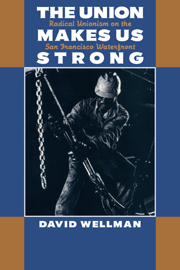Book contents
- Frontmatter
- Contents
- Preface
- Notes on unpublished sources
- PART I LABOR RADICALISM REVISITED
- PART II LOCAL COMMUNITY AND “TUMULTUOUS” DEMOCRACY: THE SOCIOCULTURAL FOUNDATIONS OF UNIONISM ON THE SAN FRANCISCO WATERFRONT
- PART III UNIONISM, WORK, AND TECHNOLOGICAL CHANGE
- 7 Work, knowledge, and control: Conventional longshoring
- 8 Work, knowledge, and control: Containerized longshoring
- 9 “Doing the right thing”: Working principles and codes of conduct
- PART IV WAGING THE BATTLE FOR WORKPLACE CONTROL ON CONTRACTUAL TERRAIN
- PART V AGREEING TO DISAGREE: BEING DEFENSIBLY DISOBEDIENT
- Conclusion: Trade union exceptionalism or prefigurative politics?
- Appendix: Doing field research: An ethnographic account
- References
- Name index
- Subject index
9 - “Doing the right thing”: Working principles and codes of conduct
Published online by Cambridge University Press: 11 November 2009
- Frontmatter
- Contents
- Preface
- Notes on unpublished sources
- PART I LABOR RADICALISM REVISITED
- PART II LOCAL COMMUNITY AND “TUMULTUOUS” DEMOCRACY: THE SOCIOCULTURAL FOUNDATIONS OF UNIONISM ON THE SAN FRANCISCO WATERFRONT
- PART III UNIONISM, WORK, AND TECHNOLOGICAL CHANGE
- 7 Work, knowledge, and control: Conventional longshoring
- 8 Work, knowledge, and control: Containerized longshoring
- 9 “Doing the right thing”: Working principles and codes of conduct
- PART IV WAGING THE BATTLE FOR WORKPLACE CONTROL ON CONTRACTUAL TERRAIN
- PART V AGREEING TO DISAGREE: BEING DEFENSIBLY DISOBEDIENT
- Conclusion: Trade union exceptionalism or prefigurative politics?
- Appendix: Doing field research: An ethnographic account
- References
- Name index
- Subject index
Summary
In aristocratic societies the poor man is familiarized from his childhood with the notion of being commanded. … In democracies servants are not only equals amongst themselves, but it may be said that they are in a way the equals of their masters. … At any moment a servant may become a master, and he aspires to rise to that condition. … Why then has the former a right to command, and what compells the later to obey?
Alexis de Tocqueville, Democracy in AmericaTHE cognitive work performed by longshoremen and the initiative expected of them are sources of potential power. These two features of waterfront work prepare longshoremen to take themselves seriously as self-conscious actors and to resist intrusions on their selfhood. By themselves, however, cognition and initiative do not translate into actual power. Something else must happen. San Francisco longshoremen are able to wrestle with their employers, and sometimes to capitalize on their potential workplace power, because codes of conduct, or working principles, have been generated by the union's political community and are enforced on the docks. In combination, these codes, along with the employers' dependence on longshoremen, have produced a situation where personhood is reciprocally acknowledged on the San Francisco docks, where longshoremen are recognized as citizens of the waterfront and accorded all the rights and obligations associated with such status.
- Type
- Chapter
- Information
- The Union Makes Us StrongRadical Unionism on the San Francisco Waterfront, pp. 178 - 200Publisher: Cambridge University PressPrint publication year: 1995



